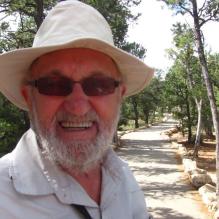Related Research Articles

Dissociative fugue, formerly called a fugue state or psychogenic fugue, is a rare psychiatric phenomenon characterized by reversible amnesia for one's identity in conjunction with unexpected wandering or travel. This is sometimes accompanied by the establishment of a new identity and the inability to recall personal information prior to the presentation of symptoms. Dissociative fugue is a mental and behavioral disorder that is classified variously as a dissociative disorder, a conversion disorder, and a somatic symptom disorder. It is a facet of dissociative amnesia, according to the fifth edition of the Diagnostic and Statistical Manual of Mental Disorders (DSM-5).

Neuropsychology is a branch of psychology concerned with how a person's cognition and behavior are related to the brain and the rest of the nervous system. Professionals in this branch of psychology focus on how injuries or illnesses of the brain affect cognitive and behavioral functions.

Cognitive neuropsychology is a branch of cognitive psychology that aims to understand how the structure and function of the brain relates to specific psychological processes. Cognitive psychology is the science that looks at how mental processes are responsible for the cognitive abilities to store and produce new memories, produce language, recognize people and objects, as well as our ability to reason and problem solve. Cognitive neuropsychology places a particular emphasis on studying the cognitive effects of brain injury or neurological illness with a view to inferring models of normal cognitive functioning. Evidence is based on case studies of individual brain damaged patients who show deficits in brain areas and from patients who exhibit double dissociations. Double dissociations involve two patients and two tasks. One patient is impaired at one task but normal on the other, while the other patient is normal on the first task and impaired on the other. For example, patient A would be poor at reading printed words while still being normal at understanding spoken words, while the patient B would be normal at understanding written words and be poor at understanding spoken words. Scientists can interpret this information to explain how there is a single cognitive module for word comprehension. From studies like these, researchers infer that different areas of the brain are highly specialised. Cognitive neuropsychology can be distinguished from cognitive neuroscience, which is also interested in brain-damaged patients, but is particularly focused on uncovering the neural mechanisms underlying cognitive processes.

Clinical neuropsychology is a sub-field of cognitive science and psychology concerned with the applied science of brain-behaviour relationships. Clinical neuropsychologists use this knowledge in the assessment, diagnosis, treatment, and or rehabilitation of patients across the lifespan with neurological, medical, neurodevelopmental and psychiatric conditions, as well as other cognitive and learning disorders. The branch of neuropsychology associated with children and young people is called pediatric neuropsychology.
Anthony David FMedSci is a British neuropsychiatrist based at University College London. Previously tenured as professor of cognitive neuropsychiatry and Vice Dean at the Institute of Psychiatry, King's College London, since 2018 he has been Director, University College London, Institute of Mental Health. He is the father of Rebecca David, a Senior Campaign Manager at Influencer LTD and Michael David a junior doctor.
Professor Christos Pantelis is an Australian professor of medicine who is the Director of the Melbourne Neuropsychiatry Centre.
Neuropsychiatry is a branch of medicine that deals with psychiatry as it relates to neurology, in an effort to understand and attribute behavior to the interaction of neurobiology and social psychology factors. Within neuropsychiatry, the mind is considered "as an emergent property of the brain", whereas other behavioral and neurological specialties might consider the two as separate entities. Those disciplines are typically practiced separately.
Dissociative amnesia or psychogenic amnesia is a dissociative disorder "characterized by retrospectively reported memory gaps. These gaps involve an inability to recall personal information, usually of a traumatic or stressful nature." The concept is scientifically controversial and remains disputed.

Behavioral neurology is a subspecialty of neurology that studies the impact of neurological damage and disease upon behavior, memory, and cognition, and the treatment thereof. Two fields associated with behavioral neurology are neuropsychiatry and neuropsychology. In the United States, 'Behavioral Neurology & Neuropsychiatry' has been recognized as a single subspecialty by the United Council for Neurologic Subspecialties (UCNS) since 2004.

Muriel Elaine Deutsch Lezak was an American neuropsychologist best known for her book Neuropsychological Assessment, widely accepted as the standard in the field. Her work has centred on the research, assessment, and rehabilitation of brain injury. Lezak was a professor of neurology at the Oregon Health and Science University School of Medicine.

John Morton, OBE, FRS is an emeritus professor at the Institute of Cognitive Neuroscience and was the director of the former Medical Research Council (MRC) Cognitive Development Unit (CDU) at University College London.
Pediatric neuropsychology is a sub-speciality within the field of clinical neuropsychology that studies the relationship between brain health and behaviour in children. Many pediatric neuropsychologists are involved in teaching, research, supervision, and training of undergraduate and graduate students in the field.

Julian Paul Assange is an Australian editor, publisher, and activist who founded WikiLeaks in 2006. He came to international attention in 2010 after WikiLeaks published a series of leaks from Chelsea Manning, a United States Army intelligence analyst: footage of a U.S. airstrike in Baghdad, U.S. military logs from the Afghanistan and Iraq wars, and U.S. diplomatic cables. Assange has won multiple awards for publishing and journalism.

Assange v Swedish Prosecution Authority were the set of legal proceedings in the United Kingdom concerning the requested extradition of Julian Assange to Sweden for a "preliminary investigation" into accusations of sexual offences allegedly made in August 2010. Assange left Sweden for the UK in 27 September 2010 and a warrant for his arrest was issued in his absence the same day. He was suspected of rape of a lesser degree, unlawful coercion and multiple cases of sexual molestation. In June 2012, Assange breached bail and sought refuge at Ecuador's Embassy in London and was granted asylum.
Clinical neuroscience is a branch of neuroscience that focuses on the scientific study of fundamental mechanisms that underlie diseases and disorders of the brain and central nervous system. It seeks to develop new ways of conceptualizing and diagnosing such disorders and ultimately of developing novel treatments.
In psychology, confabulation is a memory error consisting of the production of fabricated, distorted, or misinterpreted memories about oneself or the world. It is generally associated with certain types of brain damage or a specific subset of dementias. While still an area of ongoing research, the basal forebrain is implicated in the phenomenon of confabulation. People who confabulate present with incorrect memories ranging from subtle inaccuracies to surreal fabrications, and may include confusion or distortion in the temporal framing of memories. In general, they are very confident about their recollections, even when challenged with contradictory evidence.
The Test of Everyday Attention (TEA) is designed to measure attention in adults age 18 through 80 years. The test comprises 8 subsets that represent everyday tasks and has three parallel forms. It assess three aspects of attentional functioning: selective attention, sustained attention, and mental shifting.
Pasquale Calabrese born 27 February 1961 in Naples, Italy, is an Italian professor of clinical neurosciences at the University of Basel, Faculty of Psychology, Department of Molecular and Cognitive Neurosciences. He is a neuroscientist, experimental neurologist and medical neuropsychologist.

In 2012, while on bail, Julian Assange was granted political asylum in the Ecuadorian Embassy in London, where he sought to avoid extradition to Sweden, and what his supporters said was the possibility of subsequent extradition to the US. On 11 April 2019, Ecuador revoked his asylum, he was arrested for failing to appear in court, and carried out of the Embassy by members of the London Metropolitan Police. Following his arrest, he was charged and convicted, on 1 May 2019, of violating the Bail Act, and sentenced to fifty weeks in prison. While in prison the US revealed a previously sealed 2018 US indictment in which Assange was charged with conspiracy to commit computer intrusion related to his involvement with Chelsea Manning and WikiLeaks.

Emma Louise Arbuthnot, Baroness Arbuthnot of Edrom,, known professionally as Mrs Justice Arbuthnot, serves as a High Court judge for England and Wales since 2021.
References
- ↑ Kopelman, Prof. Michael David. Oxford University Press. 1 December 2020. doi:10.1093/ww/9780199540884.013.U255875. ISBN 978-0-19-954088-4 . Retrieved 30 August 2021.
{{cite book}}:|work=ignored (help) - 1 2 3 4 5 6 7 8 9 10 11 12 13 14 15 Collins, Seil (August 2013). "Prof Kopelman receives distinguished INS award". King's College London . Retrieved 29 August 2021.
- 1 2 3 4 5 6 7 "Michael Kopelman". British Academy of Forensic Sciences. 2021. Retrieved 29 August 2021.
- 1 2 3 4 5 6 7 8 9 10 11 12 Poole, Norman (December 2017). "Profile. The constant psychiatrist: an interview with Michael Kopelman". BJPsych Bulletin . 41 (6). United States National Library of Medicine: 364–365. doi:10.1192/pb.bp.116.055590. PMC 5709688 . PMID 29234516.
- 1 2 "Prof Michael Kopelman – Public governor". South London and Maudsley NHS Foundation Trust. Retrieved 29 August 2021.
- ↑ "Professor Michael Kopelman". King's College London. 2020. Retrieved 29 August 2021.
- 1 2 3 4 "Prof Michael Kopelman on 'Psychogenc [sic] Amnesia: Syndromes, Outcome, and Patterns of Retrograde amnesia'". International Neuropsychoanalysis Society. 3 November 2016. Retrieved 29 August 2021.
- 1 2 3 Suliman, Adela and Keir Simmons, Michele Neubert, Patrick Smith (4 January 2021). "WikiLeaks' Julian Assange cannot be extradited to the U.S. to face espionage charges, U.K. court rules". NBC News . Retrieved 29 August 2021.
{{cite web}}: CS1 maint: multiple names: authors list (link) - ↑ Baraitser, Vanessa (4 January 2021). "Request made by the Government of the United States of America for the extradition of Julian Paul Assange" (PDF). Judiciary of England and Wales . Retrieved 30 August 2021.
- ↑ Gibbons, Chip (11 August 2021). "Julian Assange Could Be Extradited to the US". Jacobin . Retrieved 30 August 2021.
- ↑ Rawlinson, Kevin (11 August 2021). "Julian Assange loses court battle to stop US expanding extradition appeal". The Guardian . Retrieved 11 August 2021.
- ↑ Smout, Alistair (11 August 2021). "U.S. tries again to extradite Wikileaks' Assange from Britain". Reuters . Retrieved 29 August 2021.
- ↑ "U.S. granted more grounds to appeal on Wikileaks founder Julian Assange extradition". NBC News. Associated Press. 11 August 2021. Retrieved 11 August 2021.